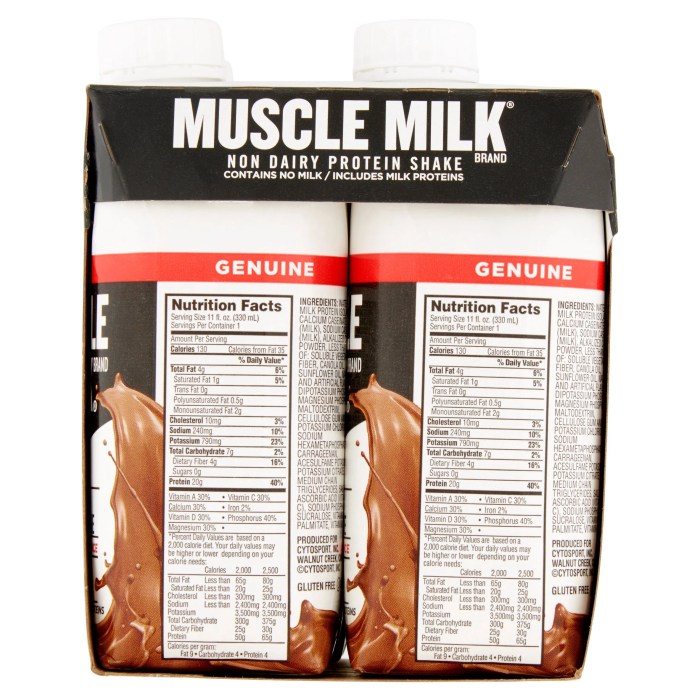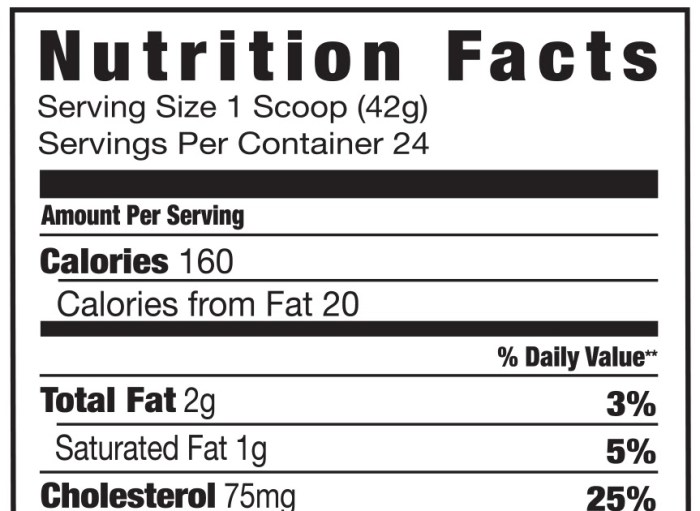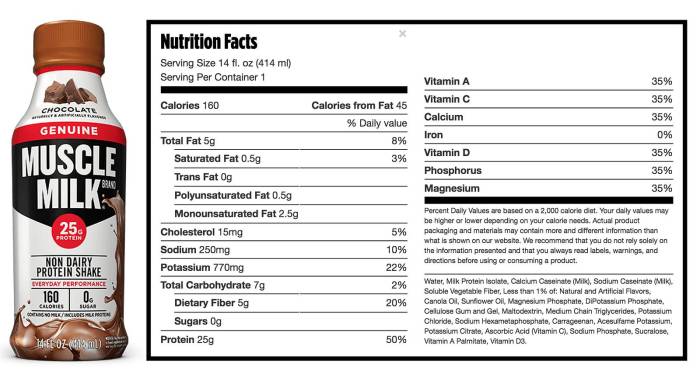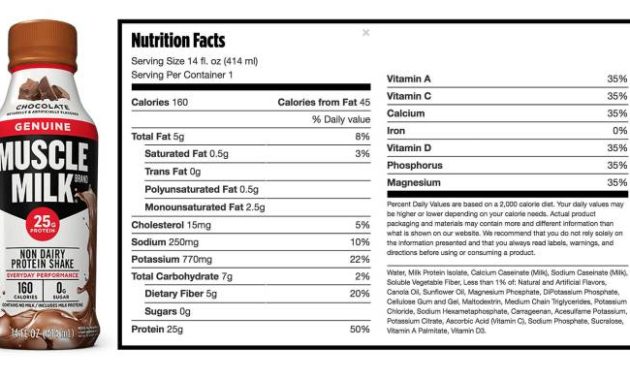Macronutrient Breakdown

Muscle milk nutrition facts label – Muscle Milk, a popular protein shake, offers a range of flavors, each with a slightly varying macronutrient profile. Understanding this profile is crucial for individuals aiming to manage their daily intake of protein, carbohydrates, and fats for optimal health and fitness goals. This section will detail the macronutrient composition of several Muscle Milk flavors and compare it to similar products on the market.
Macronutrient Content Across Muscle Milk Flavors
The macronutrient content in Muscle Milk varies depending on the specific flavor and serving size. The following table presents an approximation based on readily available nutritional information; it’s important to always check the label on your specific product for the most accurate data. Note that serving sizes may differ between flavors.
| Flavor | Protein (grams) | Carbohydrates (grams) | Fat (grams) |
|---|---|---|---|
| Chocolate | 30 | 25 | 5 |
| Vanilla | 30 | 24 | 4 |
| Strawberry | 30 | 26 | 5 |
| Cookies and Cream | 30 | 27 | 6 |
Note: These values are approximate and may vary slightly depending on the specific product and batch. Always refer to the product label for the most accurate information.
Glycemic Index and Impact on Blood Sugar
The carbohydrates in Muscle Milk contribute to its overall caloric content and can influence blood sugar levels. While the precise glycemic index (GI) of Muscle Milk isn’t consistently published by the manufacturer across all flavors, it’s generally considered to be moderate to high due to the presence of various sugars and carbohydrates. This means that consuming Muscle Milk can lead to a relatively rapid increase in blood glucose levels compared to foods with a low GI.
The impact on individual blood sugar levels will vary depending on factors such as individual metabolism, overall diet, and the presence of other foods consumed concurrently. Individuals with diabetes or insulin resistance should monitor their blood sugar carefully after consuming Muscle Milk and adjust their intake accordingly.
Comparison to Other Protein Shakes, Muscle milk nutrition facts label
Muscle Milk’s macronutrient profile sits within the range of many other commercially available protein shakes. However, significant differences exist depending on the brand and specific formulation. Some protein shakes prioritize higher protein content with lower carbohydrate and fat levels, catering to individuals focused on muscle building and weight management. Others may offer a higher carbohydrate content to provide sustained energy, making them suitable for athletes or individuals with higher energy requirements.
For instance, some whey protein isolate shakes contain significantly less carbohydrate and fat than Muscle Milk, while others, such as those designed for weight gain, contain considerably more carbohydrates and fats. A direct comparison requires examining the specific nutritional information of each competing product. Consider factors such as the type of protein (whey, casein, soy, etc.), added sugars, and other ingredients when making a comparison.
Ingredient Analysis

Understanding the ingredients in Muscle Milk is crucial for assessing its nutritional value and potential health impacts. This analysis will categorize the ingredients, examine the potential effects of specific components, and compare Muscle Milk’s formulation to those of its competitors. The goal is to provide a comprehensive overview enabling informed consumer choices.
- Protein Sources: Whey protein concentrate, whey protein isolate, casein protein.
- Sweeteners: Sucrose, maltodextrin, acesulfame potassium, sucralose.
- Thickeners/Stabilizers: Cellulose gum, xanthan gum, carrageenan.
- Other Ingredients: Cocoa (processed with alkali), natural and artificial flavors, salt, soy lecithin, medium chain triglycerides (MCTs).
Potential Health Implications of Specific Ingredients
The inclusion of artificial sweeteners like acesulfame potassium and sucralose raises concerns for some consumers. While generally recognized as safe by regulatory bodies, long-term health effects of these sweeteners remain a subject of ongoing research. Some studies have linked artificial sweeteners to potential metabolic disturbances, although the evidence is not conclusive and more research is needed to establish definitive cause-and-effect relationships.
Conversely, the presence of added sugars, such as sucrose and maltodextrin, contributes to the overall carbohydrate content and can impact blood sugar levels. High sugar intake is linked to increased risk of weight gain, type 2 diabetes, and other metabolic disorders. The level of added sugar should be considered in the context of overall daily sugar intake. Furthermore, the use of thickeners and stabilizers like cellulose gum, xanthan gum, and carrageenan, while generally considered safe at the levels used, may cause gastrointestinal discomfort in some individuals.
Comparison with Competing Brands
Muscle Milk’s ingredient list differs from competitors such as Premier Protein and Optimum Nutrition Gold Standard 100% Whey. For instance, some competitors may utilize different protein blends, emphasizing whey isolate over concentrate, resulting in a potentially higher protein concentration and lower carbohydrate content. Other brands might vary in their sweetener choices, opting for stevia or other natural sweeteners instead of artificial ones.
Variations also exist in the types and amounts of thickeners and emulsifiers employed. These differences ultimately influence the product’s taste, texture, nutritional profile, and potential health implications. A direct comparison requires reviewing the specific ingredient lists of each brand and considering individual dietary needs and preferences. For example, a consumer sensitive to artificial sweeteners would benefit from comparing the sweetener profiles across different brands to select a product aligning with their dietary restrictions.
Similarly, individuals with lactose intolerance would need to check for the presence and amount of lactose-containing ingredients.
Serving Size and Caloric Content: Muscle Milk Nutrition Facts Label
Muscle Milk’s caloric content per serving is a crucial factor to consider when integrating it into a daily diet. Understanding this value allows for proper portion control and ensures the product aligns with individual caloric needs and fitness goals. The caloric density varies depending on the specific Muscle Milk product (e.g., Ready-to-Drink vs. powder), but a general understanding of its caloric range and how it impacts daily intake across different activity levels is essential.The caloric content of Muscle Milk, like other protein shakes, primarily stems from its macronutrient composition: protein, carbohydrates, and fats.
Each of these macronutrients contributes a specific number of calories per gram, and the total caloric value is a sum of the calories derived from each. Understanding this breakdown is key to managing weight and optimizing athletic performance.
Understanding the Muscle Milk nutrition facts label is key for fitness goals. For a different perspective on convenient snacks, comparing it to the nutritional content of other foods is helpful, like checking out egg roll nutrition facts for a contrasting example. Returning to Muscle Milk, remember to consider your overall dietary needs when interpreting its label.
Calorie Breakdown per Macronutrient
The following table illustrates a typical calorie breakdown per serving of Muscle Milk, based on a standard serving size. Note that specific values may vary slightly depending on the flavor and product type. This example assumes a serving size yielding approximately 30 grams of protein, 16 grams of carbohydrates, and 5 grams of fat.
| Macronutrient | Grams | Calories per gram | Total Calories |
|---|---|---|---|
| Protein | 30 | 4 | 120 |
| Carbohydrates | 16 | 4 | 64 |
| Fat | 5 | 9 | 45 |
| Total | 229 |
Caloric Content and Daily Intake
A single serving of Muscle Milk, with its approximate 229 calories, represents a relatively small portion of the total daily caloric intake for most individuals. The appropriate daily caloric intake varies significantly based on factors like age, sex, weight, activity level, and metabolic rate.For a sedentary individual, a daily caloric intake might range from 1800 to 2000 calories. In this case, a single Muscle Milk serving constitutes roughly 11-13% of their daily needs.
Conversely, a highly active individual, such as a marathon runner or professional athlete, might require 3000-4000 calories or more per day. For them, the same Muscle Milk serving would represent a much smaller percentage (approximately 6-8%).
Serving Size and Nutritional Value
Serving size directly influences the overall nutritional value and impact on health goals. Consuming more than the recommended serving size will proportionally increase the caloric intake and the intake of all macronutrients. This can lead to unwanted weight gain if the increased calories are not balanced with increased physical activity. Conversely, consuming less than the recommended serving size will result in a lower intake of protein, carbohydrates, and other essential nutrients, potentially hindering muscle growth, recovery, or overall health depending on the individual’s goals.
Precise adherence to serving sizes is crucial for maximizing the benefits and minimizing potential drawbacks of Muscle Milk.
Allergens and Dietary Considerations

Muscle Milk, like many protein supplements, contains ingredients that may be allergenic to certain individuals. Understanding these potential allergens and the product’s suitability for various dietary restrictions is crucial for safe and effective consumption. This section details potential allergens, caters to specific dietary needs, and discusses general suitability for individuals with certain health conditions. It is important to note that this information is for general knowledge and should not be considered medical advice.
Always consult with a healthcare professional before making dietary changes, especially if you have pre-existing health conditions.
Potential Allergens in Muscle Milk
Muscle Milk products often contain milk, soy, and egg ingredients, depending on the specific flavor and formulation. These are common allergens, and manufacturers clearly list these ingredients on their packaging labels. Individuals with allergies to milk, soy, or eggs should carefully examine the ingredient list before consuming any Muscle Milk product. The presence of other potential allergens, such as tree nuts or peanuts, should also be checked on a product-by-product basis, as formulations vary.
Failure to do so could result in allergic reactions ranging from mild discomfort to severe, life-threatening anaphylaxis. Always read the label carefully and consult with an allergist or doctor if you have any concerns.
Dietary Needs and Muscle Milk
Several Muscle Milk formulations aim to cater to specific dietary needs. However, the availability and specific ingredients vary by product. Consumers should always verify the ingredients listed on the packaging to ensure suitability for their individual needs.
- Lactose Intolerance: Some Muscle Milk products are available in lactose-free versions, using alternative sweeteners and protein sources to minimize or eliminate lactose content. These versions explicitly state “lactose-free” on their packaging. Individuals with lactose intolerance should carefully check the label to ensure the product is suitable.
- Vegan Diets: Standard Muscle Milk products are not vegan due to the presence of whey protein (derived from milk). However, some manufacturers offer plant-based protein alternatives that may align with vegan dietary requirements. These products usually highlight their vegan status prominently on the packaging and utilize protein sources such as soy, pea, or brown rice protein.
Suitability for Individuals with Specific Health Conditions
Muscle Milk’s suitability for individuals with specific health conditions, such as diabetes or kidney disease, depends heavily on the specific product and the individual’s condition. This information is for general awareness and does not substitute professional medical advice.
- Diabetes: Muscle Milk products contain carbohydrates, impacting blood sugar levels. Individuals with diabetes should carefully monitor their blood sugar levels after consuming Muscle Milk and adjust their insulin or medication accordingly. Choosing low-carbohydrate options, if available, may be beneficial. Always consult a doctor or registered dietitian for personalized guidance.
- Kidney Disease: Individuals with kidney disease often need to restrict their intake of protein and phosphorus. The high protein content of Muscle Milk might not be suitable for everyone with kidney disease. A doctor or registered dietitian should be consulted to determine the appropriate protein intake and whether Muscle Milk is a safe and suitable dietary supplement.
Quick FAQs
Is Muscle Milk suitable for weight loss?
Muscle Milk can be part of a weight loss plan, but its calorie content must be factored into your daily intake. Choose lower-calorie options and combine it with a balanced diet and exercise.
Does Muscle Milk contain artificial sweeteners?
Check the ingredient list on the specific Muscle Milk product you’re considering. Some varieties may contain artificial sweeteners, while others may use natural sweeteners.
Can Muscle Milk be used by vegetarians/vegans?
This depends on the specific Muscle Milk product. Some are suitable for vegetarians, but few, if any, are vegan due to the inclusion of whey protein (a dairy product). Always check the ingredient list.
How does Muscle Milk compare to other protein shakes?
Nutritional content varies widely between protein shake brands and flavors. Comparing labels allows you to choose a product that aligns with your dietary needs and fitness goals. Consider factors like protein content, carbohydrate levels, added sugars, and other ingredients.

